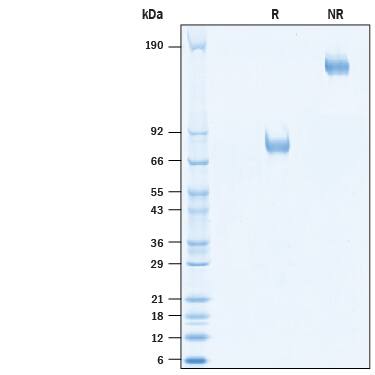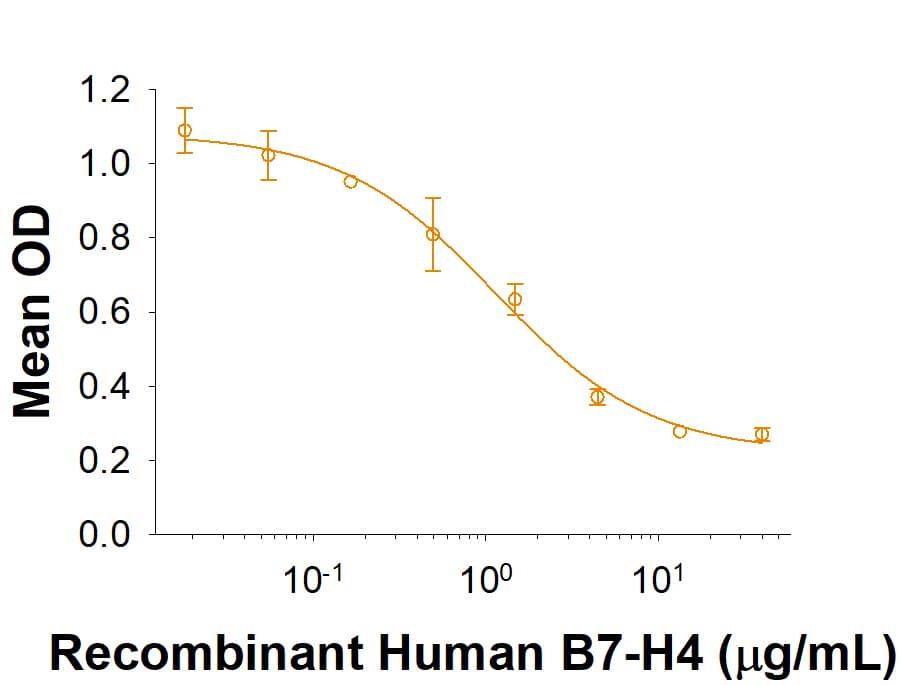Recombinant Human B7-H4 Mouse IgG2a Fc Chimera Protein, CF
R&D Systems, part of Bio-Techne | Catalog # 10641-B7

Key Product Details
Source
NS0
Accession #
Structure / Form
Disulfide-linked homodimer
Conjugate
Unconjugated
Applications
Bioactivity
Product Specifications
Source
Mouse myeloma cell line, NS0-derived human B7-H4 protein
| Human B7-H4 (Phe29-Ala258) Accession # NP_078902 |
IEGRMDP | Mouse IgG2a (Glu98-Lys330) |
| N-terminus | C-terminus |
Purity
>95%, by SDS-PAGE visualized with Silver Staining and quantitative densitometry by Coomassie® Blue Staining.
Endotoxin Level
<0.10 EU per 1 μg of the protein by the LAL method.
N-terminal Sequence Analysis
Phe29
Predicted Molecular Mass
52 kDa
SDS-PAGE
75-85 kDa, under reducing conditions
Activity
Measured by its ability to inhibit anti-CD3 antibody induced IL-2 or IFN-gamma secretion by human T cells.
The ED50 for this effect is 0.2-4 μg/mL.
The ED50 for this effect is 0.2-4 μg/mL.
Scientific Data Images for Recombinant Human B7-H4 Mouse IgG2a Fc Chimera Protein, CF
Recombinant Human B7-H4 Mouse IgG2a Fc Chimera Protein Bioactivity.
Measured by its ability to inhibit anti-CD3 antibody induced IL-2 secretion by human T cells. The ED50 for this effect is 0.2-4 μg/mL.Recombinant Human B7-H4 Mouse IgG2a Fc Chimera Protein SDS-PAGE
2 μg/lane of Recombinant Human B7-H4 Mouse IgG2a Fc Chimera (Catalog # 10641-B7) was resolved with SDS-PAGE under reducing (R) and non-reducing (NR) conditions and visualized by Coomassie® Blue staining, showing bands at 75-85 kDa and 150-170 kDa, respectively.Formulation, Preparation and Storage
10641-B7
| Formulation | Lyophilized from a 0.2 μm filtered solution in PBS. |
| Reconstitution | Reconstitute at 500 μg/mL in PBS. |
| Shipping | The product is shipped at ambient temperature. Upon receipt, store it immediately at the temperature recommended below. |
| Stability & Storage | Use a manual defrost freezer and avoid repeated freeze-thaw cycles.
|
Background: B7-H4
References
- Yi, K.H. and L. Chen (2009) Immunol. Rev. 229:145.
- Salceda, S. et al. (2005) Exp. Cell Res. 306:128.
- Zang, X. et al. (2003) Proc. Natl. Acad. Sci. 100:10388.
- Prasad, V.R. et al. (2003) Immunity 18:863.
- Sica, G.L. et al. (2003) Immunity 18:849.
- Kryczek, I. et al. (2006) J. Exp. Med. 203:871.
- Tringler, B. et al. (2005) Clin. Cancer Res. 11:1842.
- Xue, Q. et al. (2010) Stem Cells Dev. 19:27.
- Song, H. et al. (2008) Cancer Lett. 266:227.
- Park, G.B. et al. (2009) Immunology 128:360.
- Zang, X. et al. (2007) Proc. Natl. Acad. Sci. 104:19458.
- Krambeck, A.E. et al. (2006) Proc. Natl. Acad. Sci. 103:10391.
- Simon, I. et al. (2006) Cancer Res. 66:1570.
- Thompson, R.H. et al. (2008) Cancer Res. 68:6054.
- Azuma, T. et al. (2009) PloS Med. 6:e1000166.
- Suh, W.-K., et al. (2006) Mol. Cell. Biol. 26:6403.
Long Name
B7 Homolog 4
Alternate Names
B7H4, B7S1, B7x, Vtcn1
Gene Symbol
VTCN1
UniProt
Additional B7-H4 Products
Product Documents for Recombinant Human B7-H4 Mouse IgG2a Fc Chimera Protein, CF
Product Specific Notices for Recombinant Human B7-H4 Mouse IgG2a Fc Chimera Protein, CF
For research use only
